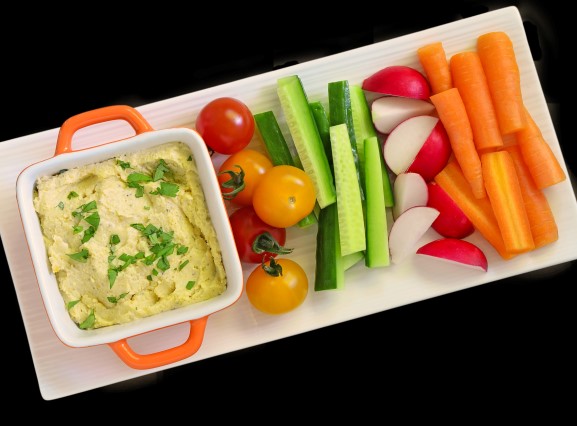5 Healthy Work Snacks (And 1 To Avoid)
 Publié le 13 April 2020
Publié le 13 April 2020
Eating well-balanced meals made from nutritional foods is something we should all strive for, whether we are working from home or at the office. However, we all get the occasional craving for a tasty snack in between meals, but this is when it is easy to break your healthy eating plan. When working from home, we are presented with several different challenges that can affect our health, including what to eat when we have a mid-day craving.
Food is a great source of comfort and we shouldn’t feel bad about turning to something delicious when we need a bit of joy. We all have to eat, and even under the best circumstances it’s impossible to eat well 100% of the time, and that shouldn’t be our goal in the first place. We’re all dipping into our favourite comfort foods right now, and there’s nothing wrong with that. If you do find yourself wishing for some healthier choices, there are several options for healthy work snacks that will leave you feeling satisfied and energized, and are simple to prepare and enjoy while working from home.
Popcorn
Many of us want a taste of salt and a satisfying crunch from our snack foods. Next time this craving hits you, reach for a bowl of popcorn. While we associate it as a treat served in comically oversized bags at the movie theatre, popcorn can actually be a relatively convenient and healthy work snack as long as you stick to a few guidelines. Popcorn itself is low in fat, sugar and total calories per serving, and provides high amounts of fiber and important antioxidants.
The problem is that the way we cook and prepare popcorn can make it much unhealthier. When heated in oil, covered in butter and sprinkled with extra toppings, the levels of sugar and fat skyrocket. One study found that the popcorn found in movie theatres contains as much fat and total calories as two Big Mac hamburgers. Attempting to recreate this buttery extravaganza of a snack in your home workspace or at the office is not a healthy option. Alternatively, by sticking to organic popcorn and swapping out butter and tons of oil for your favourite spices results in a snack that is still packed with flavour and won’t clog your arteries.
Peanuts
Almonds are all the rage right now, you can eat them, drink them, and even make pancakes out of them. This doesn’t mean that you should forget about the most dependable nut: the peanut. Nuts and legumes – the food group to which the peanut actually belongs – provide the body with healthy fats that it needs to function properly. Fatty foods are often cast in a negative light, and saturated and trans fats should definitely be avoided. Peanuts, on the other hand, contain monounsaturated and polyunsaturated fats which are part of a healthy diet when consumed in moderation.
While almonds are nearly ubiquitous among healthy snackers, per 100 grams peanuts contain higher levels of protein and lower levels of carbohydrates. Peanuts are available in dry, roasted, salted and other flavourful varieties, similar to almonds, and can normally be found at a lower price. Added together, a serving of peanuts makes for a tasty and healthy work snack that you can enjoy in your home workspace or at the office.
It should be noted, however, that peanut allergies are one of the more common food allergies, and this is something we all have to be aware of once we can return to work. DO NOT BRING PEANUTS INTO WORK IF A COLLEAGUE HAS AN ALLERGY. Almonds, pecans, walnuts, pistachios and hazelnuts all contain the types of fats that the body needs to be healthy, so stick to those if you work with someone with a peanut allergy.
Hardboiled Eggs
When you need to remain focused on work without worrying about stomach rumbles interrupting your train of thought, protein is what you need. Famously craved by bodybuilders and athletes looking to build muscle and #makegainz, protein is an essential nutrient for us non-athletes as well. In addition to building muscle mass, protein in foods makes us feel full and satisfied for long periods after we have eaten.
For a quick and tasty bite of protein, eat a hardboiled egg. The average hardboiled egg contains 6 grams of protein with only 0.6 grams of carbs, 5 grams of fat and 78 total calories. While we work from home, it only takes a few minutes to boil a pot of water and add your eggs. They are also simple to transport and take up hardly any space in the office fridge, once it’s safe to return. High in protein, and low in fat, one or two hardboiled eggs as a mid-afternoon healthy work snack will give you the energy you need to complete your projects and finish the day on a high note.
Vegetables with Hummus
Many modern eating plans will stress avoiding foods high in refined carbohydrates, such as breads, grains and cereals. Carbohydrates, however, remain an important nutrient that the body requires to function properly. Carbs are the fuel that gives your body energy and it is important to have enough energy to remain alert and active throughout the work day.
Vegetables are a good source of unprocessed carbohydrates, and are a healthy way to give your body the energy it requires. High carb vegetables include sweet potatoes and corn, and these can be healthy when eaten in moderation. Vegetables such as carrots, broccoli, bell peppers and cauliflower have good levels of carbs, and are very convenient healthy work snack options.
Chickpeas, the primary ingredient in hummus, are also an excellent source of carbs. As long as you stick to proper portions and refrain from certain types of store-bought hummus with high amounts of sugar and other additives, vegetables dipped in hummus are a great snack filled with healthy carbohydrates, protein and fiber. While working from home, you can even make your own simple hummus by throwing chickpeas, lemon juice, salt and pepper into a blender, with red peppers, garlic gloves or jalapeño if you would like a bit of added flavor.
Beans
One of the most common minerals in the human body is potassium, and it is therefore very important to ensure you have good potassium levels to maintain good health. Potassium acts as an electrolyte within our bodies, helping to regulate the nervous system and transmit signals from the brain throughout the body. Needless to say, having a strong nervous system is vital to overall health, not to mention functioning well at work. Foods rich in potassium should always be included in your diet.
Before your reach for that banana, often the food people most associate with potassium, you should know that there are several foods that offer even higher levels of this important nutrient. Beans are very high in potassium. These include the black and pinto varieties, while white beans have an average of twice as much potassium as a banana. Now bananas can still be a good healthy snack option, but if you are concerned about getting enough potassium while still watching your sugar intake you should consider periodically swapping them out for a cup of beans when it’s time for a snack.
Avoid: Smoothies
Simple, tasty and convenient – smoothies seem like the perfect snack for a busy professional, right? Wrong, unfortunately. It should be said that it is possible to create a healthy eating plan that incorporates smoothies. This is especially true when we’re working from home and have the ability to toss a few ingredients into the blender (almond milk, spinach, banana and natural peanut butter is a great combination). Homemade smoothies can be a quick and easy source of healthy fats, fiber and other nutrients that your body needs to function properly. The problem is that many smoothies can be full of sugar, additives and artificial sweeteners. This especially applies to ready-made or store-bought smoothies from restaurants, take-out spots and convenience stores.
At many popular juice and smoothie cafes and restaurants for example, the menu offers several smoothies that contain over 60-70 grams of sugar, twice as much as the total daily sugar intake recommended by health professionals. Consuming this much sugar on a regular basis is not nutritionally beneficial and in fact has negative health side effects, including higher blood pressure and an increased risk of diabetes and heart disease.
These smoothies, with high amounts of sugar and processed carbohydrates, can even contribute to a midday sugar crash. Known as reactive hypoglycemia, this is a decrease in blood glucose levels that can cause headaches, low energy, dizziness and other unpleasant symptoms that will not make your work day any easier. All this is not to say that having one smoothie will derail your whole day or your healthy eating goals, and if you enjoyed a delicious smoothie today that is fantastic. If we set the goal for ourselves of being mindful of our nutrition, smoothies can have a lot of drawbacks that we should be mindful of. Remember the old adage: everything in moderation.
Whether we are working at home or in the office, we need the right food to be at your physical, mental and emotional best throughout the day. Eating well is a goal we should all strive for, while remembering that it’s perfectly fine to have something sweet and indulgent from time to time. It is entirely possible to get the nutrients you need while still enjoying food that tastes great. If you start to feel hungry in between meals while you’re working from home, get the extra boost you need by enjoying a healthy work snack.







